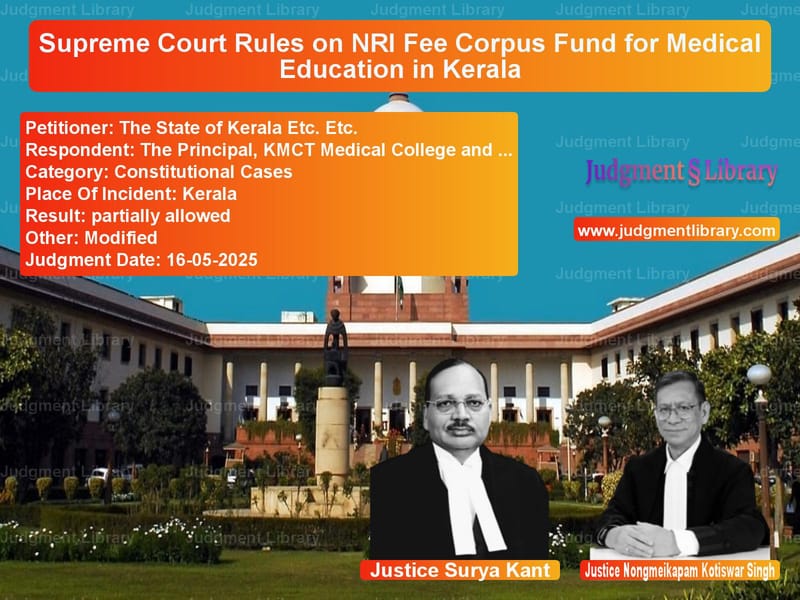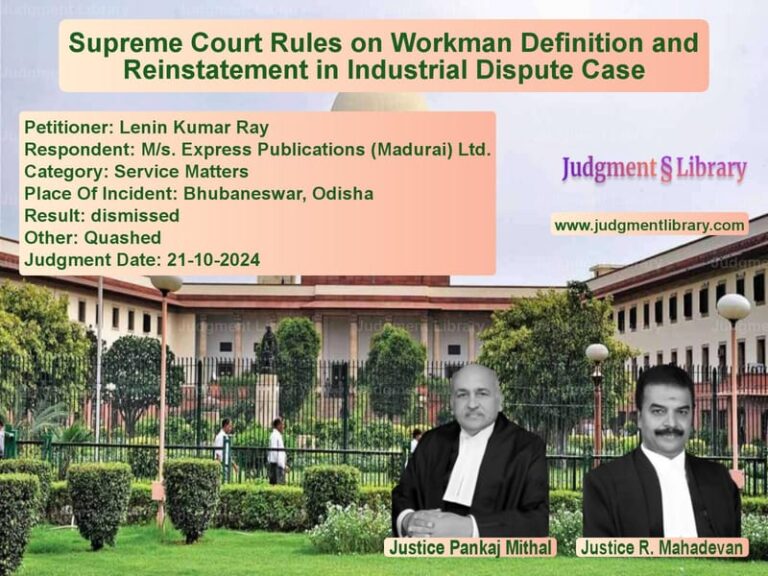Supreme Court Rules on NRI Fee Corpus Fund for Medical Education in Kerala
In a landmark judgment that balances educational autonomy with social welfare objectives, the Supreme Court of India recently delivered a comprehensive ruling on the contentious issue of creating corpus funds from NRI student fees to subsidize medical education for economically disadvantaged students. The case of The State of Kerala versus The Principal, KMCT Medical College and Others, decided on May 16, 2025, addresses fundamental questions about the limits of executive power, the rights of educational institutions, and the implementation of social justice measures in professional education.
The legal battle originated from a decision by Kerala’s Admission and Fee Regulatory Committee that directed self-financing medical colleges to create a corpus fund by setting aside Rs. 5 lakhs from the Rs. 20 lakh annual fees charged to NRI students. This fund was intended to subsidize education for Below Poverty Line (BPL) students admitted to these institutions. The State Government subsequently issued Government Order (MS) No. 107/2018/H&FWD dated June 6, 2018, to validate and support the Committee’s decision, citing the Supreme Court’s landmark judgment in P.A. Inamdar vs State of Maharashtra as its legal basis.
The Kerala High Court, in its impugned judgment dated July 23, 2020, quashed the government order but directed that the amounts already collected from NRI students be transferred to the respective institutions and maintained as a separate account for the benefit of economically weaker section students. This decision led to three sets of cross-appeals before the Supreme Court: one by the State of Kerala challenging the quashing of its government order, another by self-financing medical colleges contesting the restrictions on using the corpus fund, and finally, appeals by NRI students seeking refund of the amounts collected.
Representing KMCT Medical College and other self-financing institutions, Senior Counsel Mr. Kapil Sibal and Mr. Nikhil Goel argued that “the State or the Executive cannot impose any levy, whatever may be the nature of it, through an executive order, except under the authority of law. At present, there is no provision in the 2017 Act which empowers the State or its machinery to impose any tax or levy of any nature on self-financing medical colleges.” They emphasized that the institutions had been using enhanced fees from NRI students to grant scholarships voluntarily and that forcing them to contribute to a state-controlled fund violated their constitutional rights under Article 19(1)(g) and Article 30.
Mr. Shoeb Alam, appearing for the NRI students, supported the quashing of the government order but contended that the High Court erred in disallowing refunds to students. He argued that “NRI students are admitted to colleges on a higher fee scale to subsidize the fees of students from economically-weaker sections of society. When an NRI student is admitted to a particular college, the higher fees paid are utilized to subsidize the fees of a BPL student in that particular college, alone. It is unfair and unjust that a higher fee charged from NRI students of a particular college be utilized to subsidize the fees charged in another college or multiple other colleges in the State.”
The State of Kerala, represented by Senior Counsel Mr. Jayant Muth Raj, defended its position by asserting that “The GO dated 06.06.2018 was issued in pursuance of paragraph 131 of P. A. Inamdar (supra). The last line of paragraph 131 specifically permitted the Committee to create a mechanism to subsidize education through the fees collected from NRI students, in the absence of State Legislation on the subject. The authority to create the corpus fund thus, came primarily from the Constitution Bench judgement of this Court, which, being the law of the land, need not be supplemented or supplanted by any State Legislation or Regulations.”
Intervenor BPL students, represented by Mr. Gaurav Aggarwal, supported the government order as a welfare measure and highlighted the practical difficulties faced by economically disadvantaged students after the High Court’s decision. They argued that many BPL students were finding it difficult to continue their studies due to financial hardships and were being pressured by institutions to pay regular tuition fees.
The Supreme Court, comprising Justices Surya Kant and Nongmeikapam Kotiswar Singh, conducted a thorough analysis of the legal framework governing the issue. The Court examined whether the Committee had the power to direct creation of a corpus fund and whether NRI students were entitled to refunds of the amounts collected.
In its detailed analysis, the Court examined paragraph 131 of the P.A. Inamdar judgment, which states that “The amount of money, in whatever form collected from such NRIs, should be utilised for benefiting students such as from economically weaker sections of the society, whom, on well-defined criteria, the educational institution may admit on subsidised payment of their fee. To prevent misutilisation of such quota or any malpractice referable to NRI quota seats, suitable legislation or regulation needs to be framed. So long as the State does not do it, it will be for the Committees constituted pursuant to the direction in Islamic Academy to regulate.”
The Court observed that “It is clear that paragraph 131 of P. A. Inamdar (supra) validates and encourages the idea of charging higher fees to NRI students in order to subsidize education for students from economically-weaker or backward sections of society, who are admitted to those colleges. This aligns with the ideals of a welfare State.” However, the Court crucially noted that “the powers granted to the Committee only concern the rules of allotment of seats in the NRI quota, with particular emphasis on preventing misutilization of the allotted quota and seats.”
The Supreme Court made a significant distinction, stating that “the above-reproduced paragraph is silent on the creation of any mechanism to subsidize fees for other students and does not confer any power on the Committee in this regard. It is difficult to accept that the Committee can create a corpus fund on the strength of the transitional powers given to it in P. A. Inamdar (supra). The power to formulate creative solutions, such as a corpus fund, to benefit students from economically-weaker sections of society resides only with the State, which should be introduced through appropriate Legislation or Regulations.”
Examining the Kerala Medical Education (Regulation and Control of Admission to Private Medical Educational Institutions) Act, 2017, the Court found that “there is nothing discernible in Section 8A of the 2017 Act, based on which the Committee can assert its power to divert a part of the fee determined by it or issue a direction regarding how such diverted fee is to be utilized. We also find that Section 8A of the 2017 Act does not permit the levy of any amount which will ultimately be retained by the State, regardless of its purpose.”
The Court firmly established that “It is well-settled law that a recourse to expropriatory measures cannot be sheltered under a piece of subordinate Legislation, save and except where the power is drawn from the competent Legislation. The power to levy tax or fee cannot be delegated to the Executive unless the principal Statute expressly authorizes to do so.”
While appreciating the State’s welfare objectives, the Court emphasized that “Howsoever laudable, pious, or noble the objective behind the GO dated 06.06.2018 may be, it cannot be legitimized unless its genesis is traceable to a legislative action.”
On the issue of refunds to NRI students, the Court rejected their claims, noting that “the fees for NRI students cannot be determined solely considering the factor of subsidization of education; all the above-stated factors must be taken into account. Resultantly, the NRI students’ contention that their fees should be restricted to only subsidize the education of only two students from economically-weaker sections of society falls flat and cannot be considered a valid reason for a refund.”
In its final directions, the Supreme Court allowed the self-financing medical colleges to retain the corpus fund amounts but with the crucial condition that “a substantial part of the amount which we have allowed the colleges to retain shall have to be utilized by them for subsidizing the education of the BPL students.” The Court designated the institutions as trustees of these funds, requiring them to use the amounts specifically for subsidizing BPL students’ education until appropriate legislation is enacted.
The judgment represents a careful balancing act – upholding the rule of law by striking down executive actions without legislative backing, while simultaneously ensuring that the welfare objectives behind those actions are preserved through alternative mechanisms. It reinforces the principle that even well-intentioned social welfare measures must be implemented through proper legislative channels, while also recognizing the autonomy of educational institutions within the framework of social responsibility.
Petitioner Name: The State of Kerala Etc. Etc..Respondent Name: The Principal, KMCT Medical College and Ors. Etc.Etc..Judgment By: Justice Surya Kant, Justice Nongmeikapam Kotiswar Singh.Place Of Incident: Kerala.Judgment Date: 16-05-2025.Result: partially allowed.
Don’t miss out on the full details! Download the complete judgment in PDF format below and gain valuable insights instantly!
Download Judgment: the-state-of-kerala-vs-the-principal,-kmct-supreme-court-of-india-judgment-dated-16-05-2025.pdf
Directly Download Judgment: Directly download this Judgment
See all petitions in Education Related Cases
See all petitions in Constitution Interpretation
See all petitions in Fundamental Rights
See all petitions in Reservation Cases
See all petitions in Judgment by Surya Kant
See all petitions in Judgment by N. Kotiswar Singh
See all petitions in partially allowed
See all petitions in Modified
See all petitions in supreme court of India judgments May 2025
See all petitions in 2025 judgments
See all posts in Constitutional Cases Category
See all allowed petitions in Constitutional Cases Category
See all Dismissed petitions in Constitutional Cases Category
See all partially allowed petitions in Constitutional Cases Category







